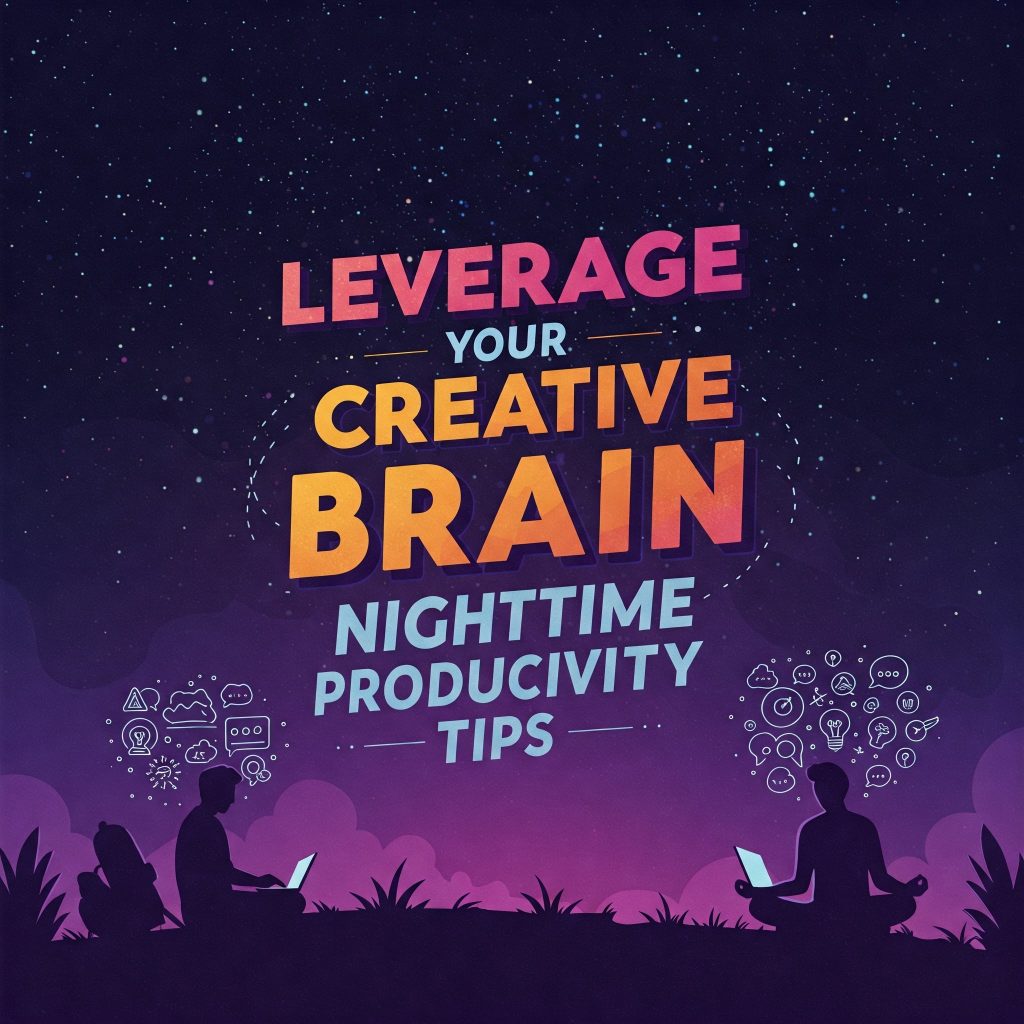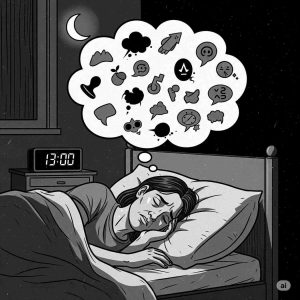Nighttime Productivity Tips: How to Stay Focused and Get More Done After Dark
For many people, nighttime offers a quiet, distraction-free window to get things done. Whether you’re a natural night owl or someone whose schedule requires evening work, mastering nighttime productivity can transform your output and mindset.
But working at night has its own challenges—fatigue, distractions, and poor lighting can sabotage your flow. In this guide, we’ll share practical, science-backed nighttime productivity tips to help you stay energized, focused, and effective well past sunset.
1. Understand Your Chronotype Nighttime Productivity Tips
Not everyone is built to work at night. Knowing your chronotype (your natural biological clock) helps you align your most important tasks with your peak focus times. If you’re naturally more creative or alert in the evening, embrace it instead of fighting it.
2. Create a Night-Friendly Workspace Nighttime Productivity Tips
Your environment plays a huge role in productivity. At night, natural light is gone, so it’s important to:
- Use warm, adjustable lighting to reduce eye strain and mimic evening calm.
- Keep your workspace tidy and minimal to reduce mental clutter.
- Play low-stimulation music like lo-fi beats or white noise to maintain focus.
- Avoid working in your bedroom, if possible, to separate sleep and productivity zones.
3. Set Clear, Small Goals

Late at night, your energy may dip, so it’s important to work with your mental bandwidth—not against it. Break your work into bite-sized tasks. Use the Pomodoro technique (25 minutes work / 5 minutes rest) or a time-blocking method to avoid burnout and keep momentum.
4. Limit Digital Distractions
Social media, notifications, and late-night doomscrolling are deadly for productivity. Try:
- Activating Do Not Disturb mode on your phone.
- Using focus tools like Forest, Freedom, or Cold Turkey to block distractions.
- Setting a cut-off time for screens to prevent overstimulation before bed.
5. Fuel Your Brain (Smartly)

Don’t go into your night work session hungry or overly caffeinated. Instead:
- Eat a light, healthy snack (nuts, fruit, or dark chocolate) to maintain energy.
- Stay hydrated, as dehydration leads to mental fog.
Do you feel more focused and inspired after dark? You’re not alone. For many people, nighttime offers a peaceful window to work without interruptions. Whether you’re a natural night owl, a student, or someone juggling a busy daytime schedule, learning how to be productive at night can make a huge difference.
Here are proven nighttime productivity tips to help you stay sharp, avoid burnout, and make the most of your evening energy.
1. Understand Your Natural Rhythm Nighttime Productivity Tips
Your body has an internal clock called the circadian rhythm, which affects your energy, alertness, and mood. If you find yourself more creative or focused at night, it’s likely you’re a night-oriented chronotype. Embrace your rhythm instead of fighting it. Schedule lighter, administrative tasks during the day and reserve nighttime for deep, focused work or creative thinking.
2. Set the Right Environment
A productive nighttime environment is calm, focused, and distraction-free. Start by:
- Using warm lighting to reduce eye strain and mimic a relaxing vibe.
- Playing soft music or white noise to create mental space.
- Keeping your workspace organized to avoid visual clutter.
Instead, create a designated space where your mind knows it’s time to focus.
3. Break Tasks Into Small Goals
Nighttime energy can fade quickly. Instead of tackling huge projects, break your work into manageable tasks. Use methods like the Pomodoro Technique (25 minutes work, 5 minutes rest) to stay fresh and maintain focus without exhausting yourself.
4. Limit Digital Distractions
Social media and phone notifications are major distractions at night. Silence them by:
- Enabling Do Not Disturb mode.
- Using focus apps like Forest or Freedom.
- Logging out of accounts not needed for work.
The fewer temptations on your screen, the better your late-night productivity.
5. Fuel Your Brain — Not Overstimulate It
Stay hydrated and eat light snacks like nuts, fruit, or dark chocolate to keep your energy stable. Avoid caffeine or heavy meals close to bedtime — they’ll affect your sleep quality and next-day performance.
6. Know When to Stop
It’s easy to lose track of time when you’re in a late-night flow, but overworking can hurt you long-term. Set a cutoff time (e.g., midnight) to wind down and give your mind a chance to rest. Good sleep is just as essential as productivity.
6. Leverage Your Creative Brain Nighttime Productivity Tips

Research shows our prefrontal cortex (responsible for logical thinking) is less active at night, while divergent thinking increases. Use this time for:
- Brainstorming new ideas
- Creative writing, design, or strategy work
- Solving problems that need “outside the box” thinking
Night is ideal for innovation, even if it’s not for admin-heavy tasks.
7. Know When to Stop
Overworking at night can backfire. Sleep is vital for memory, mood, and next-day performance. Set a hard end time for your nighttime productivity—ideally 60–90 minutes before bedtime—to allow your brain to unwind.
Tip: Use this time to journal, reflect, or plan your next day.
The world quiets down, distractions disappear, and a sense of calm takes over. If you’re a night owl or someone looking to make the most of your evenings, these nighttime productivity tips will help you stay focused and get more done — without burning out.
1. Create a Night-Friendly Workspace Nighttime Productivity Tips
Lighting is crucial. Use soft, warm-toned lamps instead of harsh fluorescent lights. This helps reduce eye strain and creates a cozy atmosphere that supports focus. Keep your desk clutter-free and add calming elements like plants or ambient sounds to stay in the zone.
2. Stick to a Routine
Even if you work late, having a structure is essential. Set specific hours for work, breaks, and sleep. Your brain will start associating that cue with productive time.
3. Limit Screen Distractions Nighttime Productivity Tips
Avoid falling into a scrolling loop on social media. Use browser extensions like StayFocusd or apps like Freedom to block distracting sites. Consider turning off notifications or using Do Not Disturb mode on your devices while you work.
4. Use Time Blocks
Divide your work into 30–45-minute blocks with short breaks in between. This prevents mental fatigue and keeps your mind fresh. Techniques like the Pomodoro Method work well at night because they keep you alert without draining your energy.
5. Fuel Wisely
Avoid caffeine late at night, but don’t ignore hunger. Light snacks like yogurt, almonds, or fruit can provide the brainpower you need to push through your to-do list without disrupting sleep.
6. Wind Down Right Nighttime Productivity Tips
Productivity doesn’t mean sacrificing rest. Set a firm stop time — ideally an hour before bed. Use that time to unplug, dim the lights, and do something relaxing like reading or journaling. Quality sleep enhances your long-term performance.
If you’re more focused and creative at night, you’re not alone. Many people experience a boost in mental clarity after dark due to fewer distractions, reduced noise, and a naturally reflective mood. With the right habits, you can turn your nighttime hours into your most productive period.
Start by setting up a calm, focused workspace. Use warm lighting, remove clutter, and eliminate distractions like social media notifications. Working in a quiet, controlled environment helps your brain focus better during evening hours.
Stick to a consistent routine. Set start and stop times for your nighttime work, and include short breaks to avoid mental fatigue. Light snacks like nuts or fruit can give your brain the fuel it needs without disrupting your sleep.
Finally, wind down properly. Shut off screens at least 30 minutes before bed and do something relaxing — read, stretch, or journal.Whether you’re a night owl or simply catching up on tasks, these simple tips will help you stay sharp and get more done after dark.
1. Design a Night-Friendly Environment

Your surroundings matter. Use soft, warm lighting instead of harsh white lights — it reduces eye strain and promotes calm focus. Keep your space tidy, and add elements that inspire you, like plants, calming scents (lavender or eucalyptus), or ambient music. A clean, peaceful workspace can set the tone for deep, focused work.
2. Set a Clear Routine
Even if you’re working late, structure is key. Choose a dedicated time slot for your nighttime tasks and stick to it. Over time, this routine signals your brain: it’s time to focus.
3. Use Time-Blocking Techniques
Break your work into 30–45 minute intervals, followed by 5–10 minute breaks. This method, such as the Pomodoro Technique, keeps your energy up and prevents burnout. Nighttime can make long tasks feel endless — time blocks provide mental checkpoints to stay on track.
4. Avoid Digital Distractions
Social media and notifications can destroy momentum. Use browser extensions like StayFocusd or apps like Forest to block tempting sites. Turn on Do Not Disturb mode or work offline if possible. When distractions are minimized, your nighttime sessions can be surprisingly efficient.
5. Fuel Yourself Smartly
Avoid caffeine late in the evening, but don’t ignore hunger. Choose light, brain-friendly snacks like fruit, nuts, or dark chocolate. Staying hydrated is also crucial — dehydration leads to fatigue and mental fog.
6. Leverage the Power of Quiet Nighttime Productivity Tips
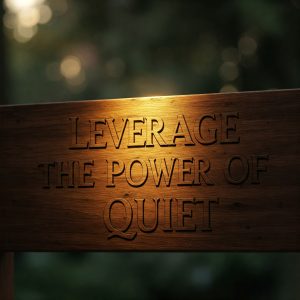
Night offers something the day rarely does: silence. Fewer calls, messages, and interruptions allow for deep work. Use this to your advantage by tackling your most creative or complex tasks during these peaceful hours.
7. Know When to Stop
The biggest mistake nighttime workers make is pushing too far. Sleep deprivation destroys productivity in the long run. Set a firm stopping time — at least 30–60 minutes before bed — and honor it. Your brain needs time to unwind before sleep.
8. Wind Down Properly Nighttime Productivity Tips
After your work session, transition into a relaxing activity. Avoid screens and bright lights. Try reading a physical book, journaling, or doing gentle stretches. A smooth wind-down routine helps you sleep better, which in turn enhances the quality of your nighttime work the following day.
1. Set a Clear Goal for the Evening Nighttime Productivity Tips
A specific focus prevents aimless scrolling or procrastination.
2. Create a Wind-Down Ritual Nighttime Productivity Tips
Establish consistent activities that signal your brain it’s time to shift into a productive-yet-calm mode. Examples:
- Brew herbal tea
- Dim the lights
- Play lo-fi or ambient music
- Stretch or do light yoga
3. Limit Distractions
Turn off notifications, use Do Not Disturb mode, and consider using productivity apps (like Forest or Pomodoro timers) to stay focused during short work blocks.
4. Use Time Blocks
Work in focused 30–45 minute chunks with 5–10 minute breaks. This helps you stay energized and mentally sharp, especially when it’s late.
5. End with Reflection
Before bed, spend 5–10 minutes journaling or planning the next day. It clears your mind and makes sleep easier.
6. Sleep Prep
Avoid screens 30–60 minutes before bed, and engage in calming activities to help you fall asleep faster and wake up refreshed.
✅ 1. Prioritize Sleep and Recovery
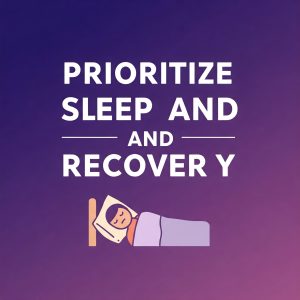
- Use blackout curtains, white noise machines, and eye masks to mimic nighttime during daytime sleep.
- Aim for 7–9 hours of uninterrupted rest.
✅ 2. Fuel Your Body Wisely
- Eat a balanced meal before your shift starts (protein + complex carbs).
- Stay hydrated, but avoid heavy meals and caffeine in the final hours of your shift to ease post-shift sleep.
✅ 3. Create an Alertness Strategy
- Take short, scheduled breaks to reset your mind.
- Move around or do light stretches to fight off drowsiness.
- Use bright lights in your workspace to signal wakefulness to your brain.
✅ 4. Organize Tasks by Energy Levels
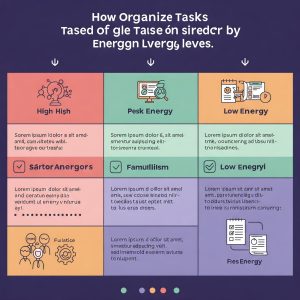
✅ 5. Have a Post-Shift Wind-Down Routine
- Avoid screens and stimulation.
- Use calming rituals (warm shower, light reading, meditation) to prepare for rest.
📌 1. Set a Specific Study Goal
Don’t just “study.” Choose a clear goal, like:
- Finish a chapter
- Review 20 flashcards
- Write 500 words of an essay
Specific goals help you stay focused and motivated.
📌 2. Create the Right Environment
- Use soft, warm lighting to reduce eye strain
- Keep your study space tidy and quiet
- Play light instrumental or lo-fi music if it helps you concentrate
📌 3. Use Time-Blocking
Try the Pomodoro Technique:
- Study for 25–45 minutes
- Take a 5–10 minute break
📌 4. Avoid Distractions
- Silence your phone or use apps like Forest or Focus@Will
- Block websites that tempt you to multitask
- Let others know you’re in a study zone
📌 5. Take Notes and Summarize
Writing things down reinforces memory. Try:
- Mind maps
- Bullet points
- Voice memos
Summarizing what you just learned before bed can also help retain it.
📌 6. Wind Down Wisely
- Stop studying at least 30 minutes before sleep
- Avoid screens after studying
- Do something relaxing to help your brain absorb what you learned
1. Adults (18-64 years):
2. Older Adults (65+ years):
- 7–8 hours of sleep is typically enough.
3. Teenagers (14-17 years):
- 8–10 hours of sleep per night.
4. School-Aged Children (6-13 years):
- 9–11 hours of sleep is needed.
5. Preschoolers (3-5 years):
- 10–13 hours of sleep, including naps.
6. Toddlers (1-2 years):
- 11–14 hours of sleep, including naps.
7. Infants (4-11 months):
- 12–15 hours of sleep, including naps.
Factors Influencing Sleep Needs:
- Stress and Health: Physical or mental health issues, or high-stress levels, may require extra sleep.
- Lifestyle: Active lifestyles or intense physical activity may necessitate more rest.
- Sleep Quality: Deep, restorative sleep is more important than simply the number of hours spent in bed.
1. Disrupted Sleep Cycle
- Circadian Rhythm Disruption: Working at night disrupts your body’s natural circadian rhythm, which can cause sleep difficulties and lead to problems like insomnia or excessive sleepiness during waking hours.
- Poor Sleep Quality: Daytime sleep often lacks the deep, restorative qualities of nighttime sleep due to environmental factors like light, noise, and interruptions.
2. Health Risks
- Increased Risk of Chronic Conditions: Long-term night shift work is linked to a higher risk of conditions like obesity, heart disease, diabetes, and gastrointestinal issues.
- Weakened Immune System: Lack of sleep and constant schedule changes can weaken your immune system, making you more susceptible to illness.
3. Mental and Physical Fatigue

- Decreased Alertness: Night workers tend to experience fatigue, decreased focus, and slower reaction times, increasing the risk of accidents and mistakes.
- Cognitive Decline: Chronic sleep deprivation can lead to memory problems, difficulty concentrating, and other cognitive impairments.
4. Social Isolation
- Disrupted Social Life: Night shift workers often find it difficult to maintain relationships, attend social events, or engage in family activities due to being awake at night and sleeping during the day.
- Reduced Social Interactions: Missing out on socializing with family, friends, and colleagues can lead to feelings of loneliness or isolation.
5. Impact on Mental Health Nighttime Productivity Tips
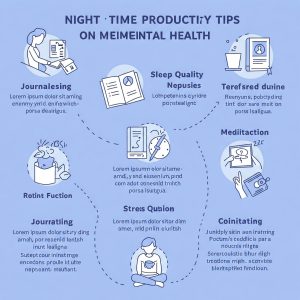
- Increased Stress and Anxiety: The irregular schedule and potential sleep deprivation can lead to heightened stress, anxiety, and even depression.
- Mood Disorders: Lack of sleep and irregular work hours can negatively affect emotional stability and overall mood.
6. Difficulty with Adaptation
- Struggling with Shift Transitions: Constantly switching between day and night shifts can be hard to adjust to, especially if the schedule changes frequently.
- Physical Discomfort: Night workers often experience issues like eye strain, headaches, and digestive problems due to working against their body’s natural rhythm.
7. Lifestyle Disruptions
- Inability to Access Services: Many businesses and services (e.g., banking, shopping) operate during regular daytime hours, which can limit your ability to handle personal tasks while on a night shift schedule.
- Limited Access to Light: Working at night means you miss out on exposure to natural sunlight, which can affect mood, vitamin D production, and overall well-being.
How to Minimize the Disadvantages of Night Shift:
- Maintain a consistent sleep schedule: Even on off-days, try to keep your sleep and wake times relatively consistent.
- Create a sleep-friendly environment: Use blackout curtains and white noise machines to improve the quality of your daytime sleep.
- Stay active: Regular physical activity during waking hours can help offset some of the health risks.
- Socialize during breaks: Try to keep in touch with friends or family during your shift breaks to reduce feelings of isolation.

